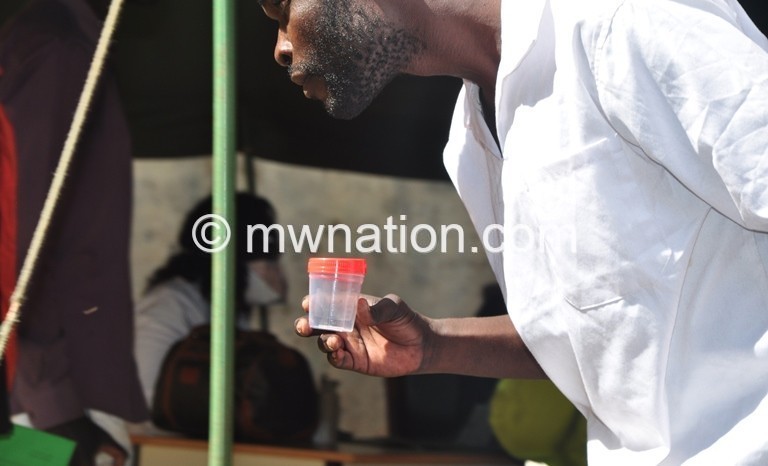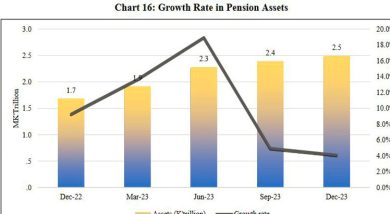Tackling latent TB in prisons
Mass screening held at Chichiri Prison in the past fortnight has indicated how skin tests detect TB cases likely to go unnoticed during conventional tests, our staff writer JAMES CHAVULA writes.

When Chikumbutso Mwenye took a skin test to determine whether he was infected with tuberculosis, the examination revealed a hard swelling on his arm.
The outcome of the tuberculin skin test means the inmate at Chichiri Prison had germs that cause TB, the biggest infectious disease killer globally.
“It was tough to accept because I had never coughed before that time,” says the 40 year-old.
Mwenye, an electrician, was imprisoned in 2016 and is expected to walk free late this year. During his imprisonment, Mwenye has participated in four mass screening campaigns organised by Medicines Sans Frontiers in collaboration with the Malawi Prison Health Services (MPHS). He first got screened in May 2017 only to do it again in November 2017, May 2018 and November 2018.
He is currently on a 12-week treatment after being diagnosed with Mycobacterium tuberculosis, which causes the disease. However, he does not have the TB disease or show symptoms. Rather, he has inactive bacteria that may result in the killer disease.
“I was confused because all the previous screenings never diagnosed me with the germs that cause TB,” he says.
After some pep talk within the confines of Chichiri Prison, Mwenye is aware that being diagnosed with TB germs does not mean that one has tuberculosis.
Cecile Catacutan, MSF-Belgium medical activity manager for the Chichiri Prison Project, unpacks the skin test.
“If you have a raised, hard bump or there’s swelling on your arm, about 10 millimeters high, you have a ‘positive’ test established through tuberculin test, it means TB germs are in your body. But it doesn’t necessarily mean you have active tuberculosis disease.
“If you don’t have a reaction, your test is negative. You don’t have TB germs in your body.”
TB germs spread through the air when a person with active TB or infected lungs coughs, sneezes, spits, laughs, or talks. Since antibiotics are used to fight TB, some strains have become resistant to drugs.
The disease remains the leading infectious killer of adults globally and imprisoned persons are at a higher risk of becoming infected and sick.
The risk is much higher in the country’s congested and unsanitary prisons, which house almost twice the recommended number of inmates.
“There is not only inadequate space for sick prisoners, but also unclear segregation of sick and healthy prisoners,” says Catacutan.
MSF work in prison
Mwenye is one of about 2 000 inmates at Chichiri prison that MSF-Belgium is serving.
MSF has been working in the country’s prisons since 2011.
Given the TB burden in prisons, the doctors without borders are currently working with the National TB Control Programme, MPHS and district health offices to provide comprehensive TB screening and treatment package in the high-risk setting of Chichiri Prison.
Anne Kitalo, MPHS TB Focal person at Chichiri Prison believes the partnership has helped inmates acquire vital TB-related services.
“When MSF arrived, we had one medical assistant and one patient attendant. MSF has helped train clinicians and the nurses. Where there is a shortfall, MSF comes in to fill the gap,” explains Kitalo.
MSF has rehabilitated a room where an X-ray machine has been mounted to improve the screening of prisoners. It is also providing human and financial resources as well as technical support to Chichiri Prison.
Among other things, MSF has worked to improve ventilation in the prison by rehabilitating the whirly bird devices in cells. It has also erected shelves in prison cells, meaning that the windows are no longer blocked by inmates’ possessions hanging in the cells.
“To detect more TB cases, MSF has built the capacity of peer educators to identify and report any inmate who is coughing or complaining of other TB associated symptoms,” says MSF nurse Dave Kambalame. “People that are on treatment are referred to the surrounding health facilities when they are exiting the prison.”
Chichiri Prison, located in Blantyre, is one of the country’s four central prisons. The country has 30 prisons, which are hugely congested and poorly ventilated.
The incarcerated population keeps fluctuating, but the United Nations Office on Drugs and Crime UNODC shows Chichiri, with the capacity of 570 inmates, takes over three times its recommended population.
The Malawi Policy on Integrated Tuberculosis/HIV Management in Prisons, drafted in 2018, recognises that prisons have higher TB notifications and prevalence than the general population.
MSF began focused work on TB in Chichiri prison in 2017 as part of mass screening efforts undertaken by a variety of stakeholders.
Ever since, TB case notification rate has more than quadrupled from 921 people per 100 000 persons in 2014 to 4 621 in 2017.
Latent TB in prisons
Since 2014, MSF in partnership with MPHS has been providing an array of health care services in prison based on the Southern Africa Development Community (SADC) standards.
The inmates are screened for HIV, TB and sexually transmitted infections at the entry, during stay and at exit.
They also undergo malnutrition and mental health problems check-up as well as hepatitis B vaccination.
“A package of care was and is still provided when the prisoner enters the prison, during their stay and at their exit. We are focusing on the three phase approach with the main focus on TB infection and disease treatment as well as advanced HIV,” says Kambalame.
MSF identified congestion and inadequate response to TB as major gaps at Chichiri Prison.
“So what we are doing is conducting active case finding where if we identify prisoners that have TB, those that are not diseased are not left to go. Rather, they undergo a skin test. If they have those inactive TB bacteria, they are given 3HP, a medication that wipes out those bacteria,” explains Catacutan.
The increase of cases of latent TB has jolted MSF and government to accelerate its intervention.
“The cases of latent TB are on the increase with active testing that is taking place. For example, in only one day in May, we registered 30 latent TB cases,” says Kitalo. “Many people, when screened, don’t have TB. But when we conduct a skin test, the results show that they have latent TB.”
Kambalame says this poses a challenge to the person, fellow inmates and community members once the inmate leaves prison.
The future outlook
Kitalo says government through MPHS has learnt a lot from MSF. With the congestion at Chichiri prison, MSF has brought an approach that should help the creation of TB-free prison in the near future.
With the maximum security prison aiming at eliminating TB within its confines—while ensuring that individuals exiting the prison are TB free—the future looks promising.
It brings hope not only among those giving a hand, but to the inmates as well.
As Mwenye prepares to go back to his cell, he smiles and whispers that he is so happy with the treatment so far.
He says: “I believe that if I go back to the community, I will not put the lives of people in my community at risk. By then, the inactive TB bacteria b would be gone.” he says.





